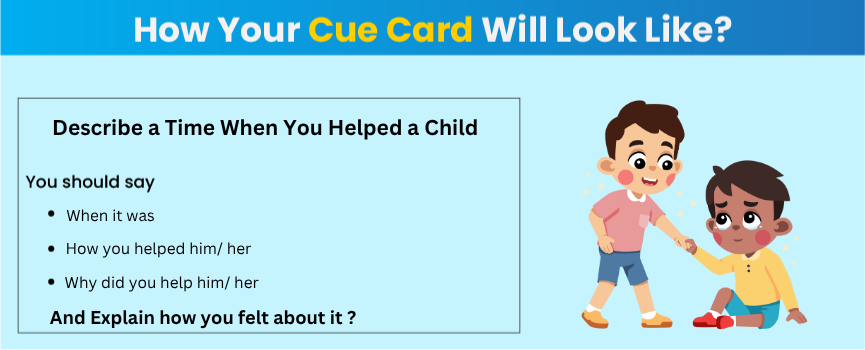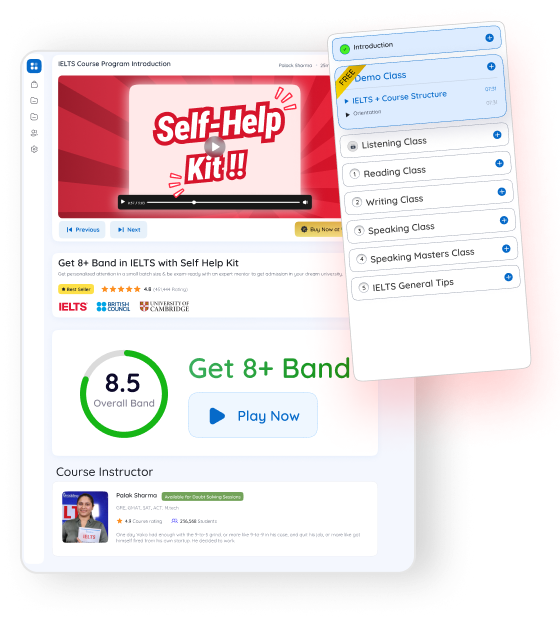Describe A Time When You Helped a Child – IELTS Cue Card
Last updated: Jul 26, 2025IELTS is a renowned exam highly accepted by universities abroad for its English language proficiency test scores. Many students face challenges in solving the cue card questions in the IELTS speaking section. Few of them struggle to polish their fluency, while others face problems managing their time. There are many more difficulties aspirants tackle, but practice is the key to success, and practising some cue card topics can help you become a master in this. Today, in this blog, we are going to discuss the Describe a Time When You Helped a Child, IELTS Cue Card topic. You will explore the sample answers, lexical resources, follow-up questions, and tips.

Table of Contents
Introduction to IELTS Cue Cards
The Candidate Task Card, or simply known as IELTS cue cards, is a crucial task asked in the IELTS speaking part 2. You get a specific topic comprising a guiding question or prompt. Further, you get one minute to read the card, make notes, and prepare your answer and another one to two minutes to speak about the topic. This section assesses a candidate’s skills to organise thoughts, fluency, pronunciation, using appropriate vocabulary, grammar, and maintaining accuracy.
In the cue card, you can get any topic related to people, places, objects, activities, events, and opinions on different sides of life. Personal experiences, abstract concepts, a person you admire and familiar places are the common topics. This was the short brief of the IELTS cue card, now, let’s navigate the right approach to answer this.
How to Answer the Cue Card?
The cue card is a mixed bag of positive and negative aspects. Focusing on the positive aspect is to effectively answer the IELTS cue cards to acquire a higher score band. Here’s how you can organise the answer.
1. Firstly, understand the topics and their prompt.
2. Utilise that one-minute preparation time to jot down key points and form an outline.
3. Structure your response, use examples, facts, and opinions.
4. Stay on the topic and manage your time.
5. Last but not least, practice regularly and maintain fluency and eye contact with the examiner, as it will help you build up confidence.
This is how you can prepare the answer for the cue card. In this task, you will get a prompt card consisting of three to four questions that can help you build your response. Let’s take a look at the prompt or questions that can be asked in “Describe a Time When You Helped a Child, IELTS Cue Card”. Have a look at these questions that can be asked in this cue card.
- When it was
- How you helped him/ her
- Why did you help him/ her
- And how you felt about it
Here is an image of what your IELTS cue card will look like in the IELTS speaking part 2. Have a look.

You might have understood everything about the IELTS cue card in the IELTS speaking section. Now, we have shared three answer samples on Describe a Time When You Helped a Child in the next section.
Describe A Time When You Helped a Child - Sample 1
This is the first sample of Describe a Time When You Helped a Child. The IELTS cue card will assist you in understanding the approach to structuring your answer effectively, using diverse vocabulary, key points, and maintaining confidence.
Introduction
In my whole life till now, I have witnessed that people who have a high level of social support ability appear to be more hard-wearing in the face of stressful situations. Today I’m going to share an incident where I helped a child while I was going to work.
When it was
This happened two years ago when I got a new job in Mumbai. It was Monday, and already late to catch the bus, but by the grace of the almighty, I was able to reach before the time. I saw a child crying on the last bench of the bus station. When I asked the reason for his crying, he said that he lost his money on the way to the bus station. That money is taken from his mother to buy a pencil and a copy for school. If he didn’t carry this, his teacher would not permit him to sit in the class.
How you helped him/ her
After listening to this and watching his tattered school attire, I realised that the child is indigent, but still manages to go to school. When I asked him about how he goes to school, he responded by toddling, as his school is within walking distance. Instantaneously, I gave him some money to buy not only his pencil and copy but also his shoes, because he was barefoot. Instantly, his eyes filled with tears of contentment. He expressed his gratitude to me while going.
Why you helped him/ her
In the throng of people waiting for the bus, I saw this innocent child and instantly felt compelled to help him. His innocent face and juvenile behaviours strained me to help him. When I was talking, he was weeping at that time as well, and when it came to helping anyone, I never stepped back.
And how you felt about it
I felt very happy and got a feeling of satisfaction and joy after helping him, although I missed my bus and waited for at least one hour for another bus, but that poor boy got so happy. Also, I felt that it was a good decision to help someone sometimes.
Conclusion
To me, helping others was always a priority, no matter how much I’m in hasten. This gives me a satisfactory and self-esteem feeling in the end.

 Access speaking Mock Test
Access speaking Mock Test Describe A Time When You Helped a Child - Sample 2
This second sample can help you to outline how to get a good score band in this IELTS cue card. This answer consists of all the vocabulary words and maintains fluency. So read on for another sample of this topic.
Introduction
I still remember my father used to tell me “don’t be afraid to give up the good to go for the great”, directing me to helping others and doing good deeds that might become delitescent for others, but it will succour in everlasting life. In contrast to this, I vividly recall an incident in which I helped a child sitting alone and crying under a tree in a park.
When it was
A year ago, when I was enjoying my stroll in the park in the evening as part of my exercise. I noticed a 5-year-old girl, looking utterly distraught, sitting under the tree. I saw her continuously clutching the kite string and crying her eyes out. The girl was alone, and many people were around, but they were engrossed in their work and had a higher chance of anything happening.
How you helped him/ her
As I got closer to her, I could see that her kite had gotten entwined high up in the tree branches. She had tried to pull the string down by herself, but the string got tightly caught in the branches, and in the end, she was completely lost. I felt a pang of empathy, and I had to offer assistance to her. Without any disinclination, I approached her and knelt to ask what was wrong and why she was crying. She stood up and explained in a shaky voice about her new kite and her problem. I reassured her that I would try my best to get it done. After climbing to the tree, I was able to see the kite string wrapped around the branches. After many attempts, I managed to dislodge the kite. Afterwards, it got detangled and it slightly floated down into the girl’s outstretched hand.
Why you helped him/ her
When I came down, I saw relief and joy on her face that was Gratifying and heart-warming for me. Her sobbing eyes got lifted, and she gave me the biggest and sincerest smile a child could give. She thanked me profusely. I helped the child because I felt it was my responsibility to assist her in getting her kite back. Moreover, watching the child alone and crying broke my heart, and I desired to guarantee his well-being and safety.
And how you felt about it
Her innocent thankfulness gave me an overwhelming sense of contentment. It was a trivial act from my side, perhaps it didn’t take more than ten minutes, but endorsing his immediate happiness was exceedingly rewarding. The cordiality I felt at that time, perceiving her distress turn to pure joy, is something that has stayed with me.
Conclusion
Adhering to my father’s note makes me a resilient person to help someone, and especially for the children, I have a soft corner for them, always available to help them at any time. Helping a child gives me a satisfactory feeling and happiness.


Describe A Time When You Helped a Child - Sample 3
In this sample, we have compiled a direct approach to answer this cue card in clear ways that can grab the examiner’s attention and help you score a high band score in the IELTS speaking module..
Introduction
Many campaigns help slum area children by offering necessary help such as distributing essential medicines, food, toys, books, and clothes. After completing the 12th, I decided to join a summer volunteering program organised by one of the renowned campaigns. Today, I’m going to share how I helped a child through this approach.
When it was
This emerged in 2019, during vacation time, I enrolled in the summer volunteering program organised by a campaign, “Little Hero Rescue”. I had signed up to volunteer to help with weekend activities in one of the schools for small, unprivileged students. In that school, I noticed one boy struggling to read.
How you helped him/ her
That young boy named Raju, who couldn’t have been more than seven to eight years old, was grappling with reading. This campaign was conducted on every weekend for these children, and I spent extra hours after the group activity to assist them in reading by making them understand the basic grammar and sound out the words. I also brought some books to keep him engaged. It was a tough nut to crack, but by hook or by crook, I managed to help him make his reading skills robust. He was just looking for a guide to help him improve this ability. I observed that he was very sharp and determined towards his learning.
Why you helped him/ her
He brought up many memories of my younger self, snooping but hesitant due to a lack of guidance and confidence. I was aware that I would have progressed faster if I had had better assistance at that time. The main reason to help him is that I believe that if a child gets the right encouragement and support, he can improve effectively and enjoy learning at a young age.
And how you felt about it
After helping Raju, I felt tremendously proud and fulfilled. Watching him start reading the books on his own and gradually gaining confidence was profoundly rewarding for me.
Conclusion
Overall, it made me think of how little deeds of kindness can make a big difference, especially in a child’s future. It gives you a satisfactory feeling by offering help that you didn’t get, but can provide others to secure their future.

Lexical Resources
In the IELTS speaking part 2, using good vocabulary is crucial for scoring high in the IELTS cue card. It directly impacts the lexical resources, which make up 25% of your speaking test grade. Additionally, a wide range of vocabulary helps to express your thoughts clearly, avoid repetition, and highlight higher levels of language skills. Thus, using vocabulary for IELTS cue card is important. Here is the table that consists of the vocabulary words used in the samples.
| Words | Meaning |
|---|---|
| Hard-wearing | Resilient |
| Depicted | Described or express the situation |
| Indigent | Poor or belong to a poor background |
| tattered | Old and dirty clothes |
| Tears of contentment | happy tears or getting satisfaction |
| A throng of people | Crowd of people |
| Juvenile | Kiddish behaviour |
| Strained | Word used for forcing |
| Weeping | Crying a lot |
| Hasten | In a hurry or rush |
| Delitescent | Concealed or hidden |
| Vividly | Quickly |
| Stroll | Walking |
| Utterly distraught | Extremely distressed |
| Clutching | Grasping or holding |
| Crying one’s eyes out | to cry a lot about any problem |
| Entwined | To tangled extremely |
| Pang | Intense feeling something |
| Disinclination | Hesitation |
| Dislodge | To remove or extricate |
| Contentment | Happiness |
| Trivial | Small act |
| Grappling | To struggle or face a problem |
| Tough nut to crack | A difficult problem or any person who is challenging to deal with. |
| By hook or by crook | By any means or somehow |
| Snooping | Curious |
Follow-Up Questions
After the second part of the IELTS speaking section, the Third part begins, in which you have to answer the question asked by the examiner. This can be general on the topics or answers. So, below are some of the questions that can be asked.
1. Why do you think it's important to help children in distress?
Answer: Helping children in distress is vital for their long-term development and future well-being. It is observed that when children experience any distress due to trauma, stress, or any other challenge, it can give a significant and lasting negative impact on them physically, mentally, and emotionally. Moreover, offering help to them reduces anxiety and stress, builds resilience, and fosters positive relationships.
2. What qualities are important when helping children?
Answer: From my perspective, no one has to learn the qualities or skills to help any children; it is self-built and one should possess. Apart from this, I think individuals must have patience, emotional control, effective communication, empathy and companionship. These skills can help you deal with children and help them in any situation.
3. What are some of the benefits of helping others, both for the helper and the helped?
Answer: Helping other provide many benefits to the helper and the recipients. For the helper, it positively boosts mood, reduces stress, increases self-esteem, and fosters a sense of purpose. While they help, they give emotional support, practical assistance, and foster the overall well-being. Both individuals feel great after offering and receiving the help.
4. Should parents teach children the importance of helping others? Why or why not?
Answer: Yes, parents should teach children the importance of helping others. This builds skills like fostering empathy, a sense of social responsibility, compassion, and contributes to an optimistic and caring world. At a young age, if any child learns to help others, they easily foster robust social skills, self-esteem, gratitude, and build strong helping skills. Additionally, parents can teach these skills through examples, activities, and talking about kindness.
Tips to Excel in IELTS Cue Card
If you are still crying over the split milk of not scoring well in the IELTS cue card, using some useful tips can help you to prepare and give an answer to the Describe a Time When You Helped a Child cue card.
1. Utilises the given preparation time.
2. Avoid memorising all the points.
3. Speak fluently by maintaining a steady pace.
4. Use linking words, idioms, phrases, and synonyms.
5. Avoid using fillers like “um”, “uh”, “like”, etc.
6. Focus on coherence and fluency rather than struggling for perfection.
7. Use a range of vocabulary for the IELTS cue card.
8. Focus on clear pronunciation.
9. Use effective language and grammar.
10. Time management is crucial; try to use various techniques to save time in the exam.

Conclusion
It can be overwhelming to answer the IELTS speaking part 2 questions easily, but practising different topics can help you to become proficient. Scoring 8+ band is not enough, you have to focus on several areas such as clear communication, organised answer, and confident delivery. You can use an IELTS mock test to solve topics like Describe a Time When You Helped a Child. By using this, you can find lacking areas, track performance, and make certain improvements. Apart from this, you can enrol in online IELTS classes at Gradding.com. Experts here will provide you with all the necessary study material and guidance to help you achieve your desired score in IELTS cue Cards.
0 comments

Practice Makes a Man Perfect!Take FREE ielts Mock Tests
Start FREE Mock TestPredict your IELTS Band

98% students got exact IELTS Band
What is your Target IELTS Band?
Get familiar with the Real IELTS Exam for Free!
Start Free Mock TestWe are available in :
BangaloreAhmedabadJaipurHyderabadKeralaPuneChandigarhMumbaiGurgaonChennaiKolkataTrivandrumNoidaKochiCalicutKottayamKollamThrissurIndoreUdaipurdisclaimer:logos and other registered trademarks of universities used on this platform are held by their respective owners. Gradding does not claim ownership or association on them, and their use is purely for informational and illustrative purposes.











